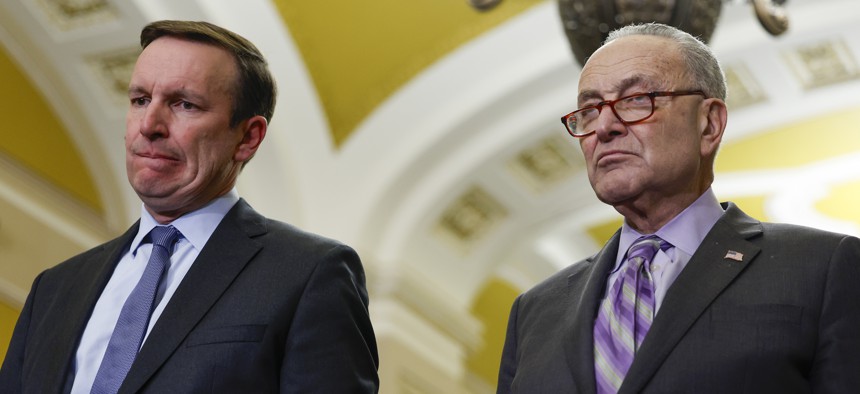Border deal dies in the U.S. Senate, despite pleas from mayors

Connecticut Sen. Chris Murphy and Democratic Senate Majority Leaders Chuck Schumer speaking at a news conference about Senate Republicans lack of support for the bipartisan Senate immigration legislation. Anna Moneymaker via Getty Images
State and local leaders called for Congress to pass the proposal, but Republican Senators acknowledged it did not have enough support after House Speaker Mike Johnson declared it “DEAD on arrival.”
Local governments’ hopes of getting $1.4 billion to help house and care for the millions of asylum-seekers who have crossed the border were stymied on Thursday.
Though a bipartisan group of senators finally agreed on a proposal Sunday after months of negotiations, Republicans lined up behind former President Donald Trump in arguing that it does not go far enough to curb immigration. They, joined by four progressive Democrats and Independent Vermont Sen. Bernie Sanders, blocked the measure, which senators said would have reduced the surge, but also would have provided much needed funding to Ukraine and Israel.
The measure failed to reach the 60 votes it needed in a procedural vote to be considered by the Senate. It failed 49 to 50.
The nation’s mayors immediately “denounced” the vote. “There is a crisis at our southern border, and this bill would have provided the policy changes and funding needed to help stabilize it,” said Mesa, Arizona, Mayor John Giles and San Diego Mayor Todd Gloria in a statement.
The mayors urged Congress to continue to address the border problem. “We cannot walk away now. We cannot simply abandon the cities across the country who are left to care for asylum seekers and other migrants,” said Giles, chairman of the U.S. Conference of Mayors’ immigration reform task force, and Gloria, vice chair for border policy for the association’s criminal and social justice committee.
In a letter to all 100 senators on Tuesday, Tom Cochran, CEO and executive director of the U.S. Conference of Mayors, wrote, “Mayors … see the negative impact of Congress’s failure to pass any kind of immigration reform on a daily basis.”
“The time to start fixing these problems is now,” he continued. “You have a bipartisan compromise before you.”
New York City Mayor Eric Adams also called for more funding at a press conference on Monday. “We think it is crucial that we fund those cities that are impacted. We see what's happening to Chicago, what's happening to New York City or Boston,” he said.
According to The New York Times, Adams is also seeking $4.6 billion from the state, almost twice as much as the $2.4 billion Gov. Kathy Hochul has pledged to send the city.
A spokesperson for Adams told Route Fifty last month the city has spent $3.1 billion between April 2022 and last November and has opened 216 sites to shelter migrants. The city expects to spend another $12 billion over the next three years unless the federal government addresses the issue.
Shortly before the vote, Democratic Senate Majority Leader Chuck Schumer said that Republicans would be making a choice. ”They can either choose what's good for the country's national interest, or they can choose what's good, at least in their minds for Donald Trump”
Sen. James Lanford, who was one of a trio of bipartisan senators who negotiated the proposal implored his fellow Republicans to vote for the measure. “We need to make progress, Oklahoma's Lankford said. “Outside the 202 area code this is not about politics. It’s about national security.”
That the measure, however, would not be able to move forward in the Senate had become clear on Tuesday after Republicans and Democrats emerged from their weekly lunch.
Republican Senate Majority Leader Mitch McConnell acknowledged at a press conference that the proposal could not pass the House after Republican Speaker Mike Johnson declared it “DEAD on arrival.”
“It became pretty clear to us that it will not become law,” McConnell said.
Republican Senate Minority Whip John Thune added that there are pieces in the proposal “that our members don't think really go far enough.”
The potential of receiving more help from the federal government after they have been tasked with dealing with the surge of migrants has been a major issue for city leaders. Their frustration was palpable during a discussion of the issue at the mayors’ annual conference in Washington, D.C., last month.
In addition to providing the funding, the measure also would have allowed more asylum-seekers to work, a key request of mayors who said it would allow migrants to feed and house themselves and ease some of the pressure on local governments.
“We need to really dig into how we deal with allowing people to work,” Adams had said at the Monday press conference. “The byproduct of not allowing residents to work is really problematic and it creates a lot of issues.”
Under the deal, the federal government would have given $2.3 billion to the U.S. Department of Health and Human Services for ‘‘refugee and entrant assistance.” The money, available through September 2025, could have been used for “culturally and linguistically appropriate services, including wraparound services, housing assistance, medical assistance, legal assistance and case management assistance.”
The proposal also would have given nonprofits like religious institutions $400 million to prepare for terrorist attacks through FEMA’s Nonprofit Security Grant Program.
Kery Murakami is a senior reporter for Route Fifty, covering Congress and federal policy. He can be reached at kmurakami@govexec.com. Follow @Kery_Murakami
NEXT STORY: Halfway through ‘unwinding,’ Medicaid enrollment is down about 10 million






